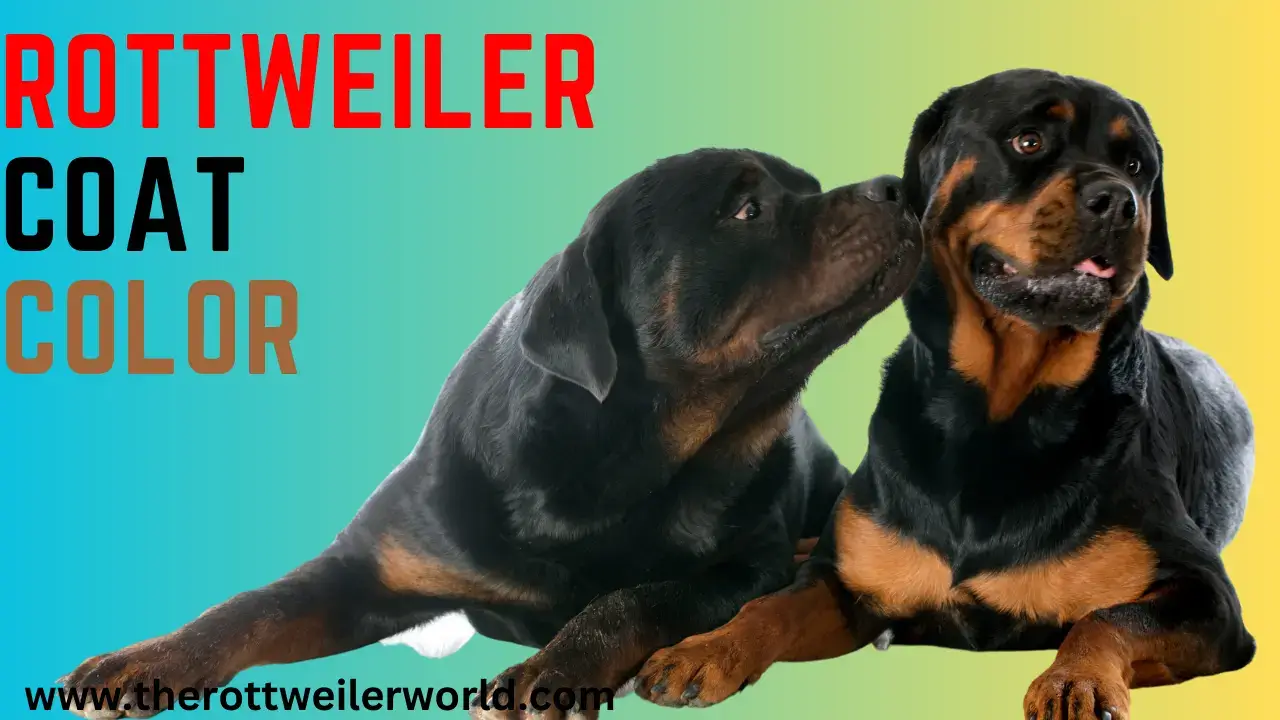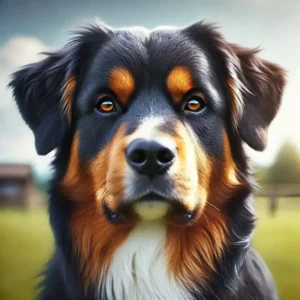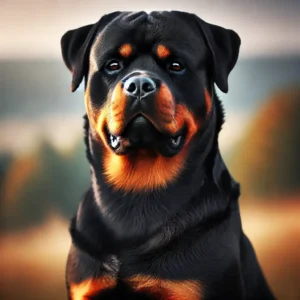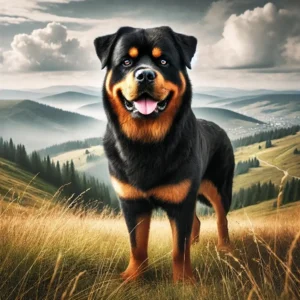Rottweiler Coat Colors: Rottweilers are renowned for their putting black and tan colors. This mixture highlights their regal stature and sets them aside from other breeds.
The base color of a Rottweiler’s coat is continually black, with tan or rust markings acting over unique areas, which include the eyebrows, cheeks, muzzle, chest, legs, and beneath the tail. These rust markings upload intensity and intensify the canine’s features.
Rottweilers are recognized for their strong and muscular build, unwavering loyalty, and specific look. Among their brilliant capabilities is their smooth coat, mainly recognized for its wealthy black coloration with nicely-defined rust markings.
However, now and again, you could encounter Rottweilers with white hair. In this newsletter, we can delve into the sector of Rottweiler colorings and explore why a few Rottweilers showcase white fur.
We may even deal with common questions, inclusive of figuring out purebred Rottweilers and discovering the rarest Rottweiler hues.
White Hair in Rottweilers:
Despite their predominantly black and tan coat, some Rottweilers may additionally show off white hair. However, it is critical to note that purebred Rottweilers should now not possess any white markings or patches. If your Rottweiler presentations white hair, it can be attributed to numerous factors:

1. Inherited Traits:
Occasionally, Rottweilers can also convey recessive genes that result in white markings. These genes will be inherited from previous generations and may now and again show up as white hairs in their coat.
2. Age-Related Changes:
As Rottweilers age, they may trade their coat shade. It is not uncommon for older Rottweilers to develop grey or white hairs, much like human beings who revel in graying with age. These changes are normally innocent and no longer affect the canine’s typical fitness.
3. Health Issues:
In a few cases, white hair may also suggest an underlying fitness problem, consisting of vitiligo or a skin circumstance. If you word a surprising appearance of white hair or any other adjustments in your Rottweiler’s coat, it’s far recommended to seek advice from a veterinarian for an intensive examination.
Identifying Purebred Rottweilers:

Determining whether a Rottweiler is purebred can be crucial for diverse motives, such as breeding, show competitions, or certainly making sure you have a genuine illustration of the breed. Here are a few key signs that will help you pick out a purebred Rottweiler:
1. Pedigree Papers: The maximum dependable manner to envision a Rottweiler’s purebred status is through pedigree papers. These documents hint at the canine’s lineage, confirming its parentage and providing insights into its genetic background.
2. Physical Characteristics: Purebred Rottweilers typically show off precise bodily tendencies, consisting of a robust and muscular build, a wide head with a nicely-described forestall, and an extraordinary black coat with rich rust markings in the precise areas.
3. Breed Standards: Familiarize yourself with the American Kennel Club (AKC) or your country’s relevant breed standards for Rottweilers. These requirements define the appropriate characteristics and bodily attributes that outline the breed.
The Rarest Rottweiler Colors
While the same old black and tan Rottweiler is the most commonly seen color aggregate, there are some uncommon coat variations that you can come upon:
Mahogany Rottweilers:
Mahogany Rottweilers, additionally referred to as purple Rottweilers, exhibit a reddish-brown hue rather than the typical black. This color variation is exceedingly uncommon and fantastically in demand with the aid of fans.

Red Rottweiler:
Red Rottweilers, a lovely version of the conventional Rottweiler breed, have captivated dog fans with their one-of-a-kind look and fascinating personalities. Red Rottweiler putting purple coat, combined with the Rottweiler’s renowned energy and loyalty, lead them to a fantastically sought-after breed.

Blue Rottweiler:
Blue Rottweilers have a dilution gene that influences their coat color, ensuing in a bluish-gray coloration instead of black. Although this coloration is considered uncommon, it’s important to be aware that blue Rottweilers may be more vulnerable to sure fitness problems related to the dilution gene.
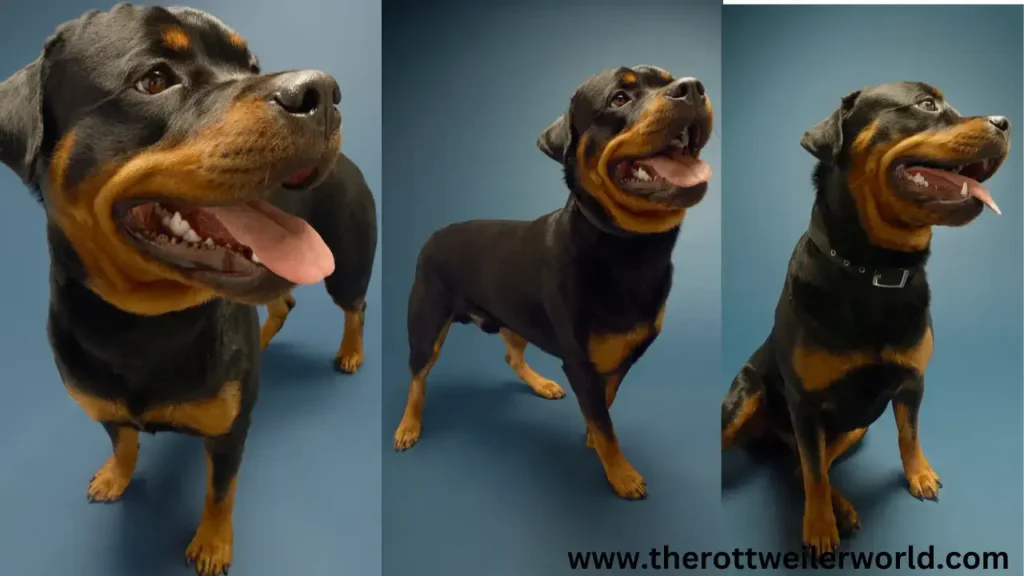
White Markings:
While now not a separate color in keeping with se, Rottweilers with limited white markings, together with a small patch at the chest or a moderate white stripe at the paws, may be taken into consideration in particular.
However, immoderate or sizable white markings aren’t a feature of purebred Rottweilers.
Conclusion:
Rottweilers are famous for their hanging black and tan coats, which sets them other from different breeds. Although the breed trendy does now not encompass white hair, it can occasionally appear due to different factors.
When figuring out a purebred Rottweiler, it is crucial to don’t forget their lineage, bodily traits, and adherence to reproduction requirements. While rare coloration versions like mahogany and blue Rottweilers exist, it’s miles crucial to prioritize a canine’s health and nicely-being above its coat coloration.
Regardless of their look, Rottweilers stay unswerving, sensible, and loving partners, bringing pleasure and companionship to their families.
The rarest color in Rottweilers is the “white” or “albino” coat color. However, it’s important to note that reputable breed standards and kennel clubs do not recognize white Rottweilers as part of the official breed standard due to potential health issues associated with albinism.
A purebred Rottweiler typically has a short, double coat with a base color of black. The markings are a rich tan or mahogany color, which appear over the eyes, on the cheeks, muzzle, chest, legs, and beneath the tail.
Rottweilers predominantly come in one color, which is black with distinct tan markings. These tan markings are usually located on specific areas of the body as mentioned in the previous question.
The Rottweiler breed is believed to have been developed from two ancient Roman breeds – the Molossus and the Roman drover dogs. These two breeds were crossed with local dogs in the town of Rottweiler, Germany, to create the Rottweiler we know today.
Rottweilers are primarily black with tan markings. Their short, double coat showcases this striking color combination, giving them a distinctive and attractive appearance.
While the classic black and tan is the standard color pattern, some Rottweilers may exhibit subtle variations in their markings. These variations are generally considered acceptable as long as the primary coat color remains black with tan.
Though reputable breed standards do not acknowledge rare coat colors like white Rottweilers due to health concerns, some unscrupulous breeders may claim to have them. It’s essential to be cautious and prioritize the well-being of the dog when selecting a Rottweiler.
No, the coat color of a Rottweiler does not impact its temperament or behavior. Rottweilers, regardless of their coloration, are known for being loyal, confident, and protective companions when properly trained and socialized.
Identifying a purebred Rottweiler involves more than just coat color. Reputable breeders can provide pedigree papers and certifications. Additionally, physical characteristics and temperament should align with the standard traits of the Rottweiler breed.
Rottweilers are famous for their hanging black and tan coats, which sets them other from different breeds. Although the breed trendy does now not encompass white hair, it can on occasion appear due to different factors. When figuring out a purebred Rottweiler, it is crucial to don’t forget their lineage, bodily traits, and adherence to reproduction requirements. While rare coloration versions like mahogany and blue Rottweilers exist, it’s miles crucial to prioritize a canine’s health and nicely-being above its coat coloration. Regardless of their look, Rottweilers stay unswerving, sensible, and loving partners, bringing pleasure and companionship to their fl
